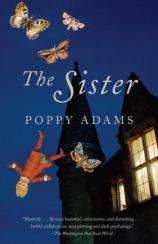Excerpt
Excerpt
The Sister

It’s ten to two in the afternoon and I’ve been waiting for my little sister, Vivi, since one-thirty. She’s finally coming home, at sixty-seven years old, after an absence of nearly fifty years.
I’m standing at a first-floor window, an arched stone one like you’d find in a church, my face close up to the diamond-shaped leaded panes, keeping lookout. For a moment I focus on the glass and catch the faint, honest reflection of my eye staring back at me, a lock of gray straggly hair in its way. I don’t often look at my reflection and to peer at this moment directly into my eye feels more disconcerting than it should, as if I can sense I’m about to be judged.
I pull my wool cardy—an old one of my father’s—more tightly around me, tucking the loose end under my arm. It’s dropped a degree today, the wind must have changed easterly during the night, and later we’ll get fog in the valley. I don’t need a barograph or a hygrometer these days, I can sense it—pressure changes, a shift in humidity—but, to tell the truth, I also think about the weather to help me take my mind off things. If I didn’t have it to ponder right now, I’d already be getting slightly anxious. She’s late.
My smoky breath turns to liquid as it hits the window and, if I rub the mist into heavy droplets, I can make it trickle down the glass. From here I can see half the length of the grassy drive as it winds through the tall skeletal limes on either side, until it disappears right, curving downhill towards East Lodge and the lane and the outside world. If I move my head a fraction to the left the drive elongates and the tops of the limes veer suddenly to the side, distorted by the imperfections of handmade glass. Moving it a little to the right splits the beech hedge in two on either side of a bubble. I know every vagary of every pane. I’ve lived here all my life and, before me, my mother lived here all her life and, before her, her father and grandfather.
Did I tell you that Vivien said in her letter she was returning for good? For some final peace, she said, because now, she said, we ought to be keeping each other company for the rest of our lives, rather than dying lonely and alone. Well, I’ll tell you now, I don’t feel lonely and I certainly don’t feel as if I’m dying, but even so I’m glad she’s coming home. Glad, and a little nervous—a surge of apprehension is swelling in my stomach. I can’t help wondering what we’ll talk about after all these years and, I suppose, if I’ll even recognize her.
I’m not, as a rule, an emotional person. I’m far too—how shall I put it?—levelheaded. I was always the sensible sister and Vivi was the adventurer, but my excitement at her impending arrival even sur- prises me.
She is late, however. I look at my wristwatch—the digital one on my left wrist. Her letter most specifically read one-thirty and, believe me, it’s not my timekeeping that’s gone awry. I keep a number of clocks just so I can be sure that, even if one or two let me down, I can always find the correct time. When you live by yourself in a house that you very rarely leave and is even more rarely visited, it’s essen- tial that you don’t lose track of the time. Every minute lost—if left uncorrected—would soon accumulate to an hour, and then hours, until—as you can imagine—you could easily end up living in a completely erroneous time frame.
Our mother, Maud, and I were always waiting for Vivi: in the hall before we went to church or shouting for her from the landing to hurry up for school. And it’s now, as I wait for her again, that I find snippets of our childhood jumping into my head, slices of conversation, things I’ve not thought about since they happened: our first pair of boots, which Vivi had chosen for us, long black ones that laced to the top; long afternoons in the summer holidays spent damming up the brook to create our own tributaries and islands; sneaking into the loggia at harvest time to drink cider before taking it to the men in the fields; giggling with Maud at Clive’s rare excitement when he created a Six-spot Burnet with five spots; our first trip to boarding school, holding each other’s clammy hands with shared anticipation, squeezed among the chemical bottles in the back of Clive’s car.
It was a childhood in perfect balance, so I’m wondering what it was that came along and changed everything. It wasn’t just one thing. There’s rarely a sole cause for the separation of lives. It’s a sequence of events, an inexorable chain reaction where each small link is fundamental, like a snake of upended dominoes. And I’ve been thinking that the very first one, the one you push to start it all off, must have been when Vivi slipped off our bell tower and nearly died, fifty-nine years ago.
Excerpted from The Sister © Copyright 2012 by Poppy Adams. Reprinted with permission by Anchor. All rights reserved.
The Sister
- Genres: Fiction, Psychological Suspense
- paperback: 304 pages
- Publisher: Anchor
- ISBN-10: 030738831X
- ISBN-13: 9780307388315




